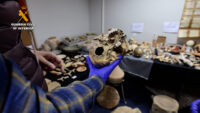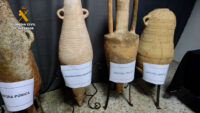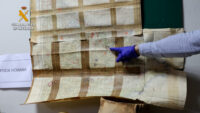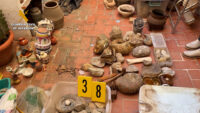 Police have recovered hundreds of archaeological artifacts, fossils and human remains in a raid on two homes in Alicante, southeastern Spain. With more than 300 archaeological objects and 200 bones, it is one of the largest collections of illegally acquired artifacts in the province.
Police have recovered hundreds of archaeological artifacts, fossils and human remains in a raid on two homes in Alicante, southeastern Spain. With more than 300 archaeological objects and 200 bones, it is one of the largest collections of illegally acquired artifacts in the province.
Alicante was founded as a fortified town around 230 B.C. by Hamilcar Barca, Carthaginian general and father of Hannibal of elephants fame, but there is evidence of human settlement in the area going back to 5000 B.C. Greek and Phoenician traders had established several small trading ports in the area by 1000 B.C., and Punic power grew over the centuries. By the time Hamilcar built what he named Akra Leuké (Greek for “White Mountain”), Carthage was in a heated competition with Rome for control of the Mediterranean coast of the Iberian peninsula, a competition it would soon lose. Scipio Africanus defeated Carthage in the Second Punic War and conquered Carthaginian Iberia in 206 B.C.
 With so rich a history, it is sad but not surprising that Alicante has drawn the attention of looters. This latest investigation began last November when authorities heard of a group of paleontological remains inside a private home. After the first raid, the owner collaborated with the police and threw another looter under the bus, leading to the raid on the second home. An even larger collection of archaeological artifacts and bones were found there. Among the pieces seized are amphorae of Iberian, Phoenician and Punic origin, Neolithic millstones, Roman-era loom weights, more than 1,000 tesserae from a Roman mosaic, large numbers of fossils and ceramics ranging in date from the Bronze Age through the middle of the 20th century.
With so rich a history, it is sad but not surprising that Alicante has drawn the attention of looters. This latest investigation began last November when authorities heard of a group of paleontological remains inside a private home. After the first raid, the owner collaborated with the police and threw another looter under the bus, leading to the raid on the second home. An even larger collection of archaeological artifacts and bones were found there. Among the pieces seized are amphorae of Iberian, Phoenician and Punic origin, Neolithic millstones, Roman-era loom weights, more than 1,000 tesserae from a Roman mosaic, large numbers of fossils and ceramics ranging in date from the Bronze Age through the middle of the 20th century.
 The owner of the second home claimed he had inherited everything from a deceased relative, and it seems like he wasn’t lying about a good portion of the collection, at least. But even so, the deceased relative had no legal title to any of this. This was confirmed in said relative’s own hand because he kept handwritten notebooks with maps noting the exact locations where he had stolen the items. Looters don’t usually take assiduous notes, from what I’ve seen, so this is a pretty remarkable record that is sure to be of enormous use to archaeologists.
The owner of the second home claimed he had inherited everything from a deceased relative, and it seems like he wasn’t lying about a good portion of the collection, at least. But even so, the deceased relative had no legal title to any of this. This was confirmed in said relative’s own hand because he kept handwritten notebooks with maps noting the exact locations where he had stolen the items. Looters don’t usually take assiduous notes, from what I’ve seen, so this is a pretty remarkable record that is sure to be of enormous use to archaeologists.
 The two men are under investigation for misappropriation of objects of historic, cultural or scientific value. The objects are currently being stored at the Archaeological Museum of Dénia. Researchers hope the notebooks documenting the finds will aid in identifying the objects’ ages and histories, and perhaps lead to the discovery of previously unknown archaeological sites.
The two men are under investigation for misappropriation of objects of historic, cultural or scientific value. The objects are currently being stored at the Archaeological Museum of Dénia. Researchers hope the notebooks documenting the finds will aid in identifying the objects’ ages and histories, and perhaps lead to the discovery of previously unknown archaeological sites.